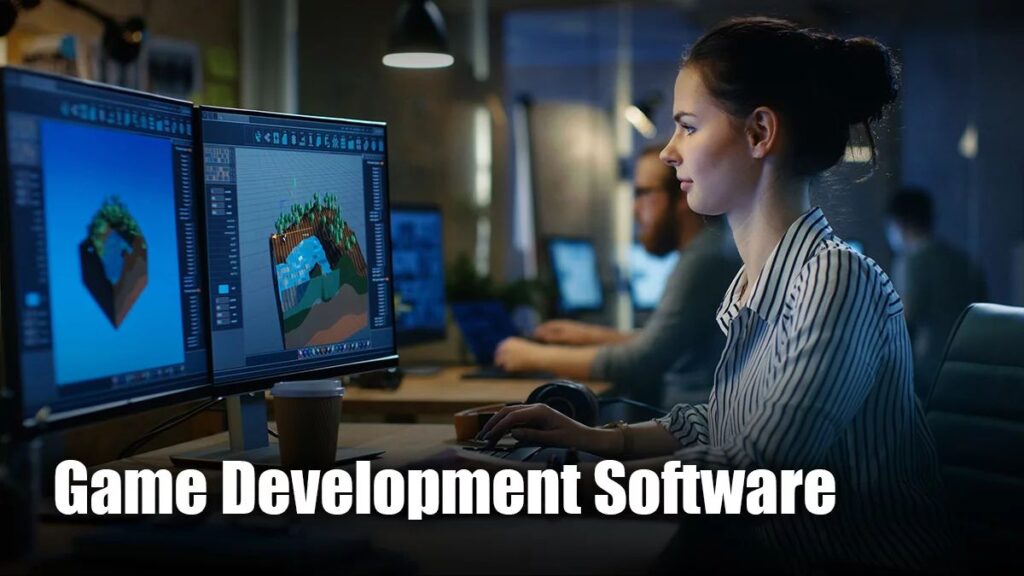Game development is an exciting and rewarding career path, but it’s not without its challenges. Aspiring developers need to learn a wide array of skills to craft the engaging, interactive experiences that make games enjoyable. From coding and programming to designing environments and characters, the journey of a game developer is complex and requires proficiency in a variety of areas. One of the most essential tools in the game development process is game design software. In this article, we’ll dive into the best game design software for aspiring developers, highlighting both the benefits of each tool and how they can enhance the development process for beginners and experts alike.
What Is Game Design Software?
Game design software refers to the tools that developers use to create, design, and develop video games. These programs allow developers to build environments, characters, gameplay mechanics, and even create the entire narrative structure of a game. Game design software can range from simple drag-and-drop programs aimed at beginners to highly advanced, professional tools used by large game development studios. For aspiring developers, it’s important to choose software that is not only powerful and feature-rich but also easy to use and learn.
As a beginner, you might not need all the features offered by high-end software, but you’ll still require tools that can help you bring your creative ideas to life. The right software will help you understand the fundamental concepts of game design and provide you with the tools to experiment, learn, and eventually create your own games.
Criteria for Choosing Game Design Software
Before diving into the list of software options, it’s important to understand the criteria for choosing the best game design software for aspiring developers. Several factors can influence your decision, such as:
- Ease of Use: As an aspiring developer, you want software that is easy to learn and intuitive to use. The last thing you need is to be overwhelmed by a complex interface that makes it harder to focus on the creative side of game design.
- Learning Curve: Some tools come with steep learning curves, while others are more beginner-friendly. For aspiring developers, it’s best to select software that offers tutorials, documentation, and community support to guide you through the learning process.
- Features: Depending on what type of game you want to create, you’ll need software with certain features. For example, if you want to design 3D games, you’ll need software that supports 3D modeling and animation.
- Cost: Aspiring developers often operate on a tight budget, especially if they’re just starting their careers. Fortunately, many game design software programs offer free or affordable versions for beginners.
- Community and Support: A strong community of users and developers can make a huge difference in your learning experience. Look for software that has an active forum, tutorials, and resources to help you overcome challenges.
Now that we’ve established the criteria, let’s take a look at some of the best game design software options for aspiring developers.
Unity
Unity is one of the most popular game engines in the world, and it’s a favorite among aspiring developers. Unity’s ease of use, flexibility, and extensive documentation make it an excellent choice for beginners. Whether you’re designing 2D or 3D games, Unity has the tools to help you create professional-level games with minimal effort.
Features
- Cross-Platform Support: Unity allows you to develop games for multiple platforms, including PC, consoles, mobile devices, and even virtual reality (VR) and augmented reality (AR).
- Asset Store: Unity’s Asset Store is a treasure trove of pre-made assets, including 3D models, textures, sound effects, and more. This feature allows you to speed up your development process without having to create everything from scratch.
- C# Programming Language: Unity uses C#, one of the most popular programming languages, making it easier for aspiring developers to learn and apply their skills.
- Community and Tutorials: Unity has a large, active community and offers a wide variety of tutorials and resources, which are invaluable for newcomers to the world of game development.
Why Aspiring Developers Should Choose Unity
Unity is highly accessible to newcomers and has a large number of resources available for self-learning. With a wealth of tutorials, a massive community, and extensive documentation, aspiring developers can easily start creating their games. Unity also offers a free version of the software for smaller projects, which is great for those just getting started.
Unreal Engine
Unreal Engine is another top-tier game engine that offers powerful features for aspiring developers. While it may be slightly more complex than Unity, Unreal Engine is an excellent choice for those who want to push the boundaries of game development and create visually stunning games.
Features
- Blueprint Visual Scripting: Unreal Engine features a powerful visual scripting system called Blueprint, which allows developers to create game logic without writing code. This is especially useful for aspiring developers who may not yet be comfortable with programming.
- High-Quality Graphics: Unreal Engine is known for its exceptional graphical capabilities, making it the go-to engine for AAA games. With Unreal Engine, you can create photorealistic environments, lighting, and character models.
- Cross-Platform Support: Like Unity, Unreal Engine supports development for a wide variety of platforms, including PC, consoles, and mobile devices.
- C++ Programming Language: For those who are ready to dive into more complex programming, Unreal Engine also supports C++, providing greater control over game mechanics and performance.
Why Aspiring Developers Should Choose Unreal Engine
Unreal Engine is ideal for aspiring developers who are interested in creating high-end, visually impressive games. The Blueprint system allows beginners to get started without learning how to code, and as you advance, you can transition to using C++ to build more complex games. The engine’s impressive graphics capabilities are also a significant draw for developers looking to create visually stunning experiences.
Godot
Godot is a free, open-source game engine that’s been gaining popularity among indie game developers and aspiring developers alike. One of its most attractive features is its flexibility and lightweight nature, making it easy to use without sacrificing power.
Features
- GDScript: Godot features its own scripting language called GDScript, which is similar to Python and is specifically designed for game development. It’s easy to learn and well-suited for beginners.
- 2D and 3D Support: While Godot’s 3D capabilities are not as advanced as Unity or Unreal Engine, its 2D capabilities are second to none. Aspiring developers interested in creating 2D games will find Godot to be an excellent choice.
- Visual Editor: Godot’s visual editor is simple and intuitive, making it easy to design scenes and game levels without needing to write a lot of code.
- Free and Open Source: Godot is completely free to use and open-source, making it a great choice for aspiring developers who are just starting out and have a limited budget.
Why Aspiring Developers Should Choose Godot
For aspiring developers who are focused on creating 2D games or want a lightweight, flexible engine, Godot is a fantastic choice. It’s free, open-source, and easy to learn, with a scripting language (GDScript) that’s beginner-friendly. The engine’s visual editor also makes it accessible for those who may not yet be comfortable with writing code.
GameMaker Studio 2
GameMaker Studio 2 is a popular choice for developers who want to create 2D games with ease. It’s known for its user-friendly interface and drag-and-drop features, making it an excellent choice for aspiring developers who are just getting started.
Features
- Drag-and-Drop Interface: GameMaker Studio 2 allows developers to create games using a drag-and-drop interface, eliminating the need for extensive coding knowledge.
- GameMaker Language (GML): For those who want to move beyond the drag-and-drop interface, GameMaker Studio 2 also features its own scripting language, GML, which is similar to C++ and is relatively easy to learn.
- Cross-Platform Development: GameMaker Studio 2 allows you to develop for multiple platforms, including Windows, macOS, Android, iOS, and more.
- Asset Marketplace: Like Unity, GameMaker Studio 2 has an asset marketplace where you can find pre-made assets to speed up development.
Why Aspiring Developers Should Choose GameMaker Studio 2
GameMaker Studio 2 is perfect for aspiring developers who want to create 2D games without having to write a lot of code. Its drag-and-drop interface makes it incredibly easy to use, and the transition to using GameMaker Language (GML) is seamless for those who want to dive deeper into programming.
Conclusion
Choosing the right game design software is an important step in becoming a successful game developer. As an aspiring developer, you should focus on finding software that aligns with your current skill level and the type of games you want to create. Unity and Unreal Engine are excellent choices for those who want to develop both 2D and 3D games with powerful features, while Godot is a great open-source option for those focused on 2D game development. GameMaker Studio 2 is ideal for developers who are just starting out and want an easy-to-use platform for creating 2D games.
No matter which software you choose, remember that game design is a continuous learning process. Don’t be discouraged if things feel challenging at first—stay motivated, seek out tutorials, and practice your skills. With the right tools and determination, you can achieve your dream of becoming a game developer.



